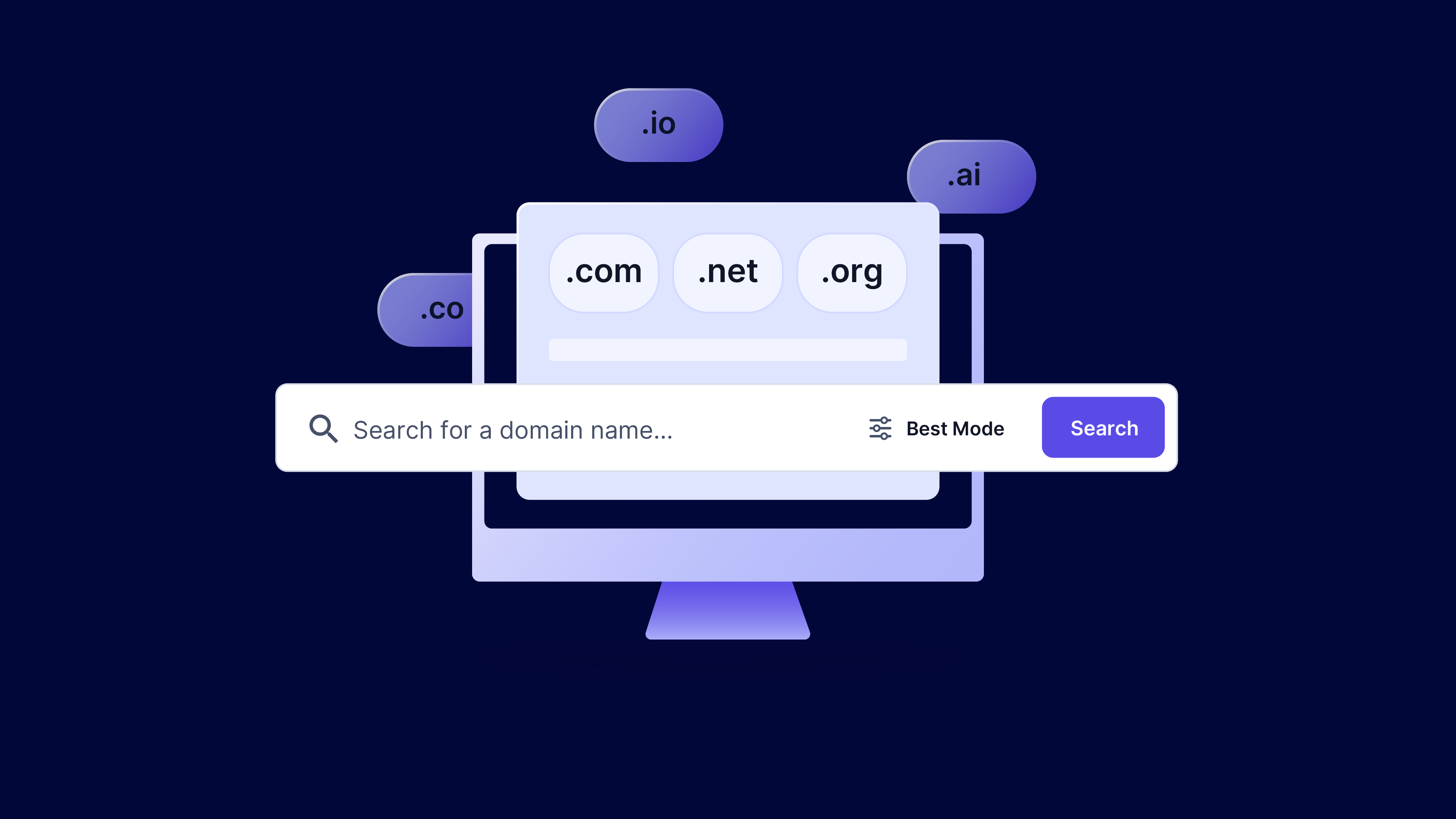
Accept crypto with CoinGate
Accept crypto with confidence using everything you need in one platform.
How to Choose the Best Domain Registrar? Avoid These Mistakes

A domain registrar is a company that sells and manages domain names, allowing businesses and individuals to secure their online presence.
Choosing the right domain registrar is a crucial step when creating a website.
While the process of buying a domain may seem straightforward, many people make costly mistakes by choosing the wrong registrar. From hidden fees to security risks, these pitfalls can lead to frustration and unnecessary expenses.
By the end of this guide, you’ll know what to look for in a domain registrar, the key differences between personal and business use, the common mistakes to avoid, and some recommendations for the best crypto-friendly domain registrars out there.
Looking for crypto-friendly domains, hosting or other services? Try CoinGate’s Merchant Directory.
What Makes a Good Domain Registrar?
Not all domain registrars offer the same level of service, transparency, or security. Pricing transparency is crucial, as many registrars attract customers with low first-year prices, only to increase renewal rates significantly.
Being aware of hidden fees, such as charges for domain privacy or transfers, helps avoid unexpected costs. Choosing a registrar with fair and predictable long-term pricing ensures that there won’t be any unpleasant surprises when renewing your domain.
In addition, security features play a key role in protecting your domain. WHOIS privacy protection is essential to keep personal contact details private as it reduces the risk of spam and identity theft.
Two-factor authentication (2FA) also adds an extra layer of security, while domain locking prevents unauthorized domain transfers. Additionally, DNSSEC (Domain Name System Security Extensions) protects your domain from hijacking and phishing attacks, ensuring a higher level of safety.

A user-friendly interface makes managing domains, renewals, and DNS settings simple. For those handling multiple domains, bulk management features are helpful, and having an auto-renewal option minimizes the risk of accidental expiration.
Customer support is another important factor. Reliable 24/7 customer support through live chat, email, or phone can be crucial, especially when dealing with technical issues like DNS settings and transfers.
Another aspect to consider is domain transfer policies. Some registrars make transferring domains difficult or expensive, so checking the transfer policy beforehand is necessary. A good registrar allows seamless domain transfers without excessive fees or delays.
Additional features can also enhance the user experience, such as free email forwarding, subdomains, and custom DNS settings. For business users, domain-based email integration with services like Google Workspace or Microsoft 365 can be essential, while support for multiple TLDs (Top-Level Domains) allows greater flexibility.
To summarize the qualities of best domain registrars:
- Pricing Transparency – cheap first-year prices often come with high renewal rates. Watch for hidden fees on domain privacy and transfers. Choose a registrar with fair, predictable long-term costs.
- Security Features – ensure WHOIS privacy to protect personal details, enable 2FA for extra security, use domain locking to prevent unauthorized transfers, and opt for DNSSEC to guard against hijacking.
- Ease of Use – a simple dashboard, bulk management for multiple domains, and auto-renewal options make domain management hassle-free.
- Customer Support – reliable 24/7 support via live chat, email, or phone is essential. Choose a registrar with knowledgeable staff for DNS and technical assistance.
- Domain Transfers – some registrars complicate transfers or charge high fees. Look for an easy, cost-effective transfer policy.
- Additional Features – consider registrars that provide free email forwarding, subdomains, and support for multiple TLDs. Business users may require integration with Google Workspace or Microsoft 365.
Personal vs. Business Use: What’s Different?
The ideal domain registrar depends on whether the domain is for personal or business use.
For personal users, affordability, simplicity, and privacy are the main concerns. WHOIS privacy protection is crucial to prevent spam and unwanted data exposure. Email forwarding is useful for those who don’t require a full professional email setup, and advanced DNS features or premium support are usually unnecessary.
For businesses, security and reliability take priority since the domain is essential for branding and credibility. Professional email integration, such as Google Workspace or Microsoft 365, ensures a professional online presence.
Strong customer support is necessary to handle domain-related issues promptly, and scalability is important for businesses that may require multiple domains, subdomains, or premium DNS features in the future.
| Feature | Personal Use | Business Use |
|---|---|---|
| Pricing Focus | Low-cost | Value & reliability |
| WHOIS Privacy | Very important | Important but not always necessary |
| Security Features | 2FA, domain lock | Advanced security (DNSSEC, team management) |
| Email Needs | Optional (basic email forwarding) | Essential (Google Workspace, professional email) |
| Customer Support | Not a top priority | 24/7, premium support |
| Multiple Domains | Not common | Often required for branding & expansion |
Common Mistakes to Avoid When Choosing Domain Registrar
Many people choose the wrong domain registrar due to misleading offers or lack of research.
One common mistake is falling for low initial prices without checking renewal fees. Some registrars offer low first-year prices but significantly increase costs upon renewal, so it is crucial to check long-term pricing before purchasing.
Ignoring WHOIS privacy protection is another misstep. Without this feature, personal details become publicly available, leading to spam and potential security risks. Some registrars charge extra for privacy, while others include it for free.
Choosing a registrar with poor security features can also be detrimental. Without domain locking, unauthorized transfers become a risk. Not having 2FA increases the likelihood of unauthorized access, and the absence of DNSSEC leaves domains vulnerable to hijacking attacks.
Customer support quality should not be overlooked. Some registrars offer slow, unhelpful, or automated-only support, which can be problematic if a website goes down or DNS issues arise.
Another mistake is failing to review domain transfer policies. Some registrars make transferring domains difficult or impose high fees, whereas a good registrar allows seamless transfers.
Overpaying for unnecessary add-ons is also common. Many registrars push extra services such as premium DNS, website builders, or expensive email hosting, even when more affordable alternatives exist.
Additionally, using an unreliable or shady registrar can lead to domain hijacking, reselling of expired domains, or price gouging. Researching customer reviews and avoiding registrars with a history of poor business practices is essential.
Finally, not considering long-term needs can cause issues down the line. Businesses may need multiple domains, business email, or subdomains. Choosing a registrar that supports future expansion without excessive costs or restrictions ensures a smoother experience.
How to Avoid These Pitfalls – A Quick Checklist
In short, to avoid these common mistakes:
- Check renewal pricing rather than just focusing on the first-year cost.
- Ensure WHOIS privacy is included or available at a low cost.
- Look for strong security features, including 2FA, DNSSEC, and domain lock.
- Read customer reviews to assess support quality.
- Make sure domain transfers are easy and affordable.
- Avoid unnecessary upsells for add-ons you don’t need.
- Select a registrar that supports long-term growth.
CoinGate Recommends: the Best Crypto-Friendly Domain Registrars
Below are recommendations of the best domain registrars that accept cryptocurrency payments through CoinGate:
Hostinger
Hostinger’s Domain Name Search offers a wide range of extensions—from classics like .com, .net, .org to niche and country-specific TLDs—often starting at just $0.99 (.shop, .online). Standard .com domains run around $4.99–9.99/year, and all eligible domains include free WHOIS privacy protection.
Domains activate instantly with flexible registration terms (up to 3 years or more) and full DNS management through Hostinger’s control panel. Payments are supported via card, PayPal, Google Pay, Alipay, and cryptocurrencies (via CoinGate).
The tool works independently of hosting, but Hostinger’s Premium and Business plans (12+ months) include a free domain for the first year, saving you setup costs.
Virtono
Virtono offers a diverse range of domain extensions with competitive pricing. They accept multiple payment methods, including cryptocurrencies, providing flexibility for users. Their services are complemented by additional offerings such as web hosting, cloud VPS, and an AI website builder, facilitating quick and professional website creation.
Regery
Regery offers a wide selection of domain extensions at competitive prices. Their user-friendly interface and efficient customer service have been praised by users. Additionally, they provide free website monitoring and SSL certificates, enhancing website security and performance.
Stablepoint
Stablepoint provides instant domain registration with access to over 750 TLDs. Their services include full DNS management, free WHOIS privacy protection, and seamless domain transfers. They also offer 24/7 customer support and free website migrations, ensuring a smooth transition for new users.
HostZealot
HostZealot supports a variety of domain extensions and offers comprehensive DNS management tools. They provide free DNS services for all registered domains and send timely renewal notifications. Users have commended their responsive technical support and competitive pricing, especially for VPS plans.
HosterDaddy
HosterDaddy provides domain registration services with various extensions, including .com, .in, and .org, at affordable prices. Each domain comes with a user-friendly Domain Manager, enabling efficient management of domains, renewals, and billing. They also offer free SSL certificates, daily backups, and 24/7 dedicated support, ensuring a secure and reliable service.
XetHost
XetHost offers domain registration services supporting various extensions, including .hu TLDs. They provide competitive pricing and accept multiple payment methods, including cryptocurrencies, offering flexibility for clients. Their services are complemented by hosting solutions such as VPS, dedicated servers, and web hosting, catering to diverse online needs.
Conclusion
Choosing the right domain registrar is not only about the price. Transparency, security, ease of use, and long-term reliability should be key considerations. Whether purchasing a domain for personal or business use, avoiding common pitfalls will save money and frustration.
A well-chosen domain registrar ensures that a website remains secure, accessible, and easy to manage for years to come. Doing research, reading customer reviews, and checking the fine print before making a decision can make all the difference.
FAQ About Choosing the Right Domain Registrar
1. Can I transfer my domain to another registrar anytime?
Yes, but some registrars impose restrictions. ICANN requires a 60-day waiting period after registration or transfer before you can move your domain again. Choose a registrar with an easy transfer process and no excessive fees.
2. Do I need WHOIS privacy protection for my domain?
Yes, if you want to keep your personal details private. Without WHOIS privacy, your contact information is publicly available, making you a target for spam, scams, and identity theft. Some registrars offer this for free, while others charge extra.
3. What happens if I forget to renew my domain?
Most registrars offer a grace period after expiration, but after that, your domain may enter a redemption period or be auctioned. Auto-renewal is the best way to prevent losing your domain. Always check a registrar’s renewal policies before purchasing.
4. Is it better to register a domain with my web hosting provider?
Not necessarily. While some web hosts offer free domains with hosting plans, they might charge higher renewal rates or limit domain management features. Using a separate domain registrar gives you more control and flexibility.
5. How do I know if a domain registrar is trustworthy?
Check customer reviews, pricing transparency, security features, and domain transfer policies. Avoid registrars with a history of hidden fees, poor support, or aggressive upselling. Reliable registrars prioritize security, fair pricing, and strong customer service.
Accept crypto with CoinGate
Accept crypto with confidence using everything you need in one platform.

